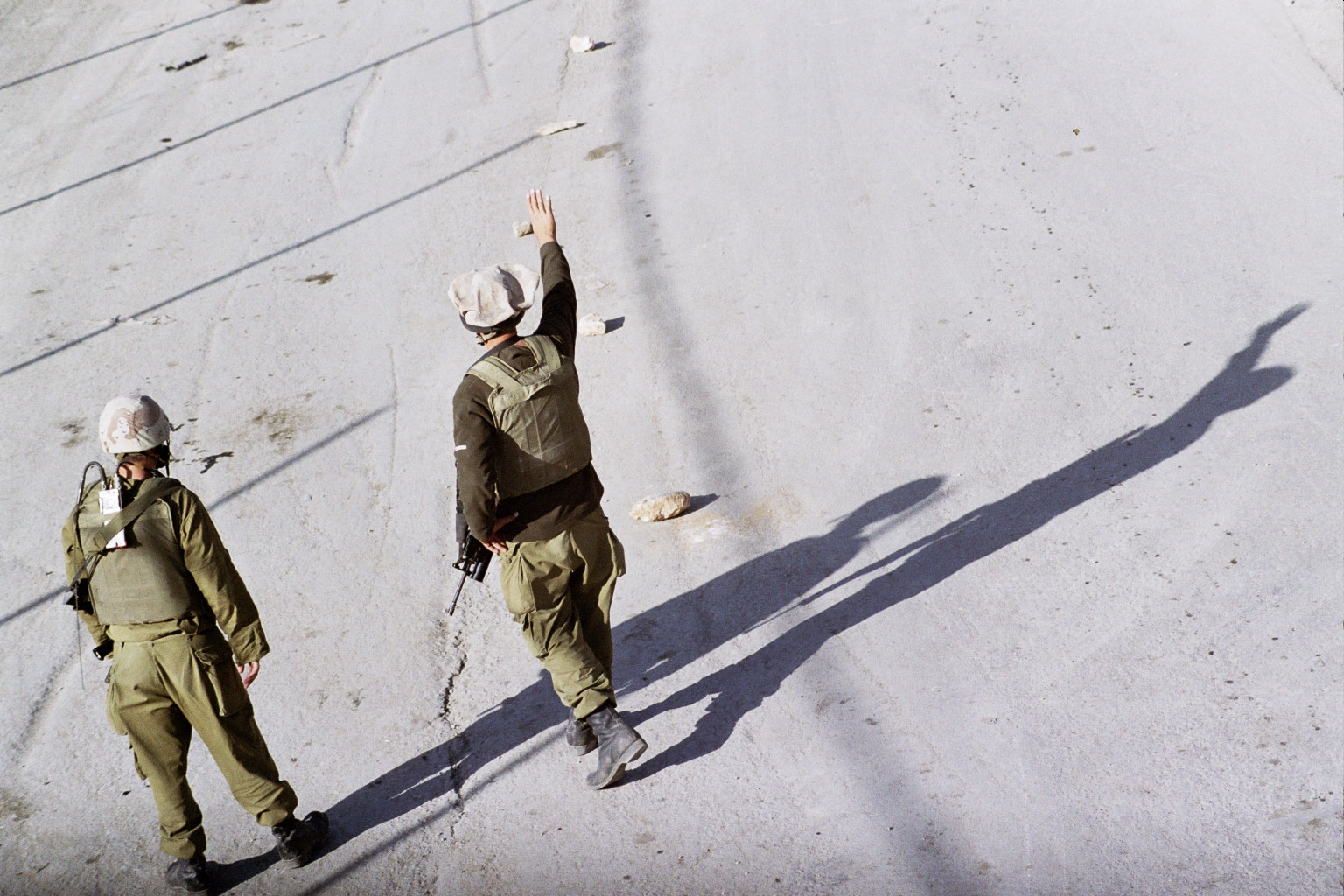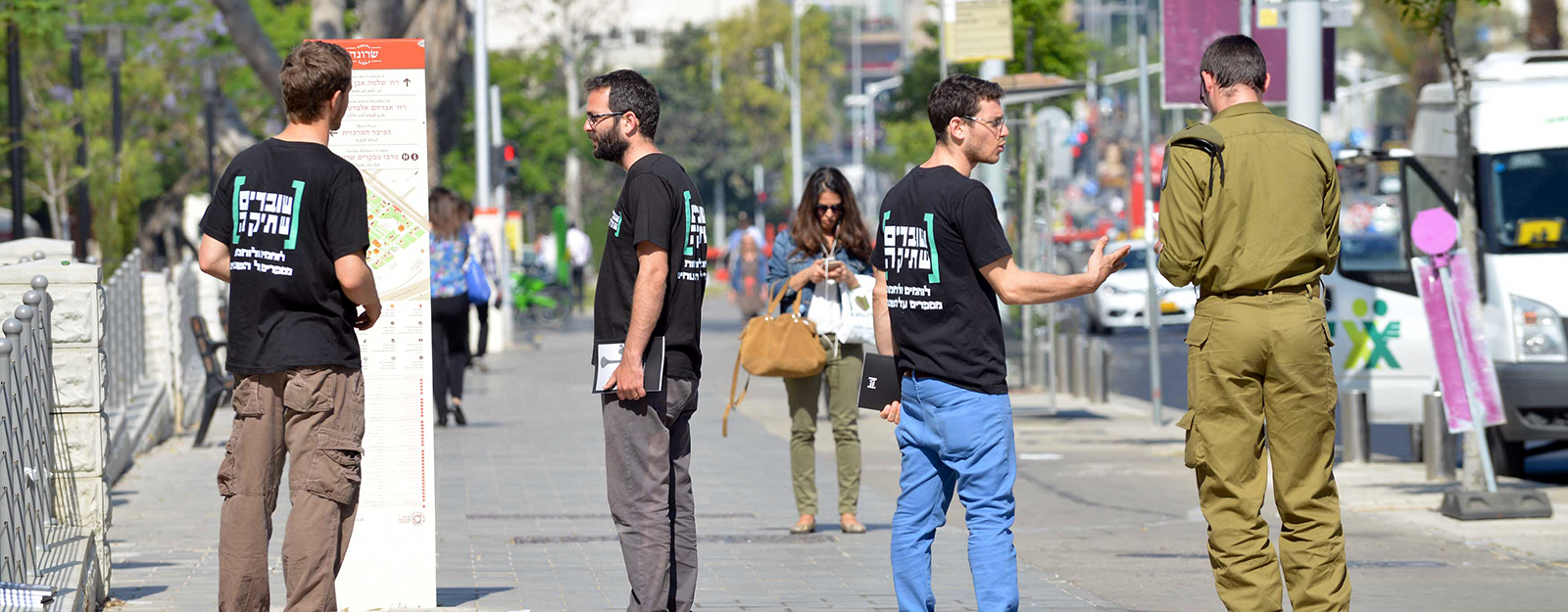What was your part in this story? I was trying to stop them.
What were your orders? Try to stop them with physical force of any kind. Physical force. But they didn’t give us authorization, there’s no way, you can’t give authorization for that. The problem is that even if the soldier doesn’t want to, he finds himself protecting settlers while they do terrible things to the Palestinians. Because if a Palestinian comes and throws a stone, you can immediately start shooting in the air and throwing stun grenades at him, doing a thousand and one other things and no one will say a word. But you can’t do anything to a Jew. You can only try to catch a settler and remove him with force. And normally, the Jews who live there know the soldiers’ tactics. And when they go to destroy a house inside the casbah, they just go in, destroy a wall. They destroyed the Sharabati house, and there’s a mess there, even today. You’re one miserable soldier among hundreds of children, and it feels like a game of cops and robbers. A soldier stands at the entrance to the casbah and stretches out his arms, and the seven-year-old kids run right underneath in every direction. He might grab one kid, but four more come. There’s nothing to do, they just come and run into the casbah. You try to stop them to protect them, because it’s the casbah after all, but they run straight into the casbah anyway, they go into homes, break all the windows, break whatever they can break, destroy everything, and then they declare the house theirs, they say that they’ve taken another house in Hebron. Their behavior is astonishing. All of a sudden the police arrive, the settlers throw eggs at them, and you find yourself—I found myself in a situation where I was walking right next to a settler woman, trying to protect the baby she’s holding while she’s walking through the crowd. We’re inside an Arab house, in the casbah. There are no Arabs there, of course, but there are around a hundred Jewish kids who’ve smashed everything in the house. They smashed the wall, they broke through the wall to create a path from the house to their neighborhood, because there was only a wall separating that house from their neighborhood. And I’m in this crazy situation, where the police are trying to get the settler kids outside, and I’m standing between the police and some woman holding a baby. I’m trying to protect her and her baby, and the settlers hit me with an egg, while they were trying to hit the police. And the police are taking all these blows, and the special female patrol is getting hit by the girls, and at the [Leibowitz] funeral we’re fighting with all of the settlers—and the next day they bring food to the post.
What happened at the funeral? The funeral was completely insane. I was inside the post, and at a certain point the settlers just shot at the post. Not Palestinians—Jews. By accident, because they just ran into the casbah and started spraying gunfire in the air. Shooting on autopilot, with no judgment. And because of it a little girl was killed and another boy got a knife in the back. Just mindless destruction.
Where were the police? The police couldn’t control the settlers because it’s impossible. They’re everywhere—the police can’t control a hundred kids running around the casbah. Two soldiers are standing and trying to block the entrance, but it’s like they’re playing a game with seven-year-old kids. You can’t control seven-year-old kids.
What if there were a hundred Palestinian children? Oh, there’d be a huge difference, that’s exactly what I was saying. First of all, Palestinian kids would never do it. If a hundred Palestinians showed up, then in principle they’d also be able to do whatever they wanted. But they’d never do that, because the moment Palestinian kids would try to infiltrate the Jewish neighborhood, there’d most likely be shooting in the air, and then there’d be rubber bullets, and there’s a good chance that some kid would die, and then all the others would take off. But a Jewish kid—no one would ever shoot at him.
So you don’t have permission to use any kind of force against the settlers? Just physical contact.
You can’t arrest them? We could. We’ve arrested them occasionally, but it’s rare. Very rare. Our treatment of them is too forgiving. We didn’t usually arrest them.
What did they do with all the people who went beserk during the protest? Were there any proceedings against them? Did you know who they were? Not always. Normally there are all kinds of hilltop kids who come from Itamar and Elon Moreh, and in Hebron no one knows who they are. And so a bunch of sixteenand seventeen-year-old kids came, created havoc, and left. No one knew how to catch them, and or how to locate them, and most of the soldiers didn’t have the motivation to do so. You don’t want to be a policeman, it’s not your job, it’s not your concern, you’re there to try and protect the . . . I mean, maybe if you saw kids coming and throwing stones at a Palestinian shop, then you’d try to stop them, because that seems completely unreasonable, but usually you don’t put too much effort into chasing after them and arresting them. It’s just not like that. There was a lot of hostility. During the whole funeral proceedings there was chaos in the streets, and officers of all ranks actually got into physical fights with the settlers. The settlers came and spat on the battalion commander—just about the worst thing they could do. Again, as I said before, and it’s important to say it—the soldiers in Hebron are the greatest victims. No, the Palestinians are the greatest victims, but the soldiers are next. They’re in this place where they have to go against their will and support the settlers, who can do whatever they want, abuse Palestinians as much as they want. Soldiers try to stop the settlers, but they don’t have the power to do it.









 testimonies
testimonies  media & content
media & content 










 The settlers went into the casbah, killed a little girl
The settlers went into the casbah, killed a little girl 

 terms of use & privacy policy
terms of use & privacy policy